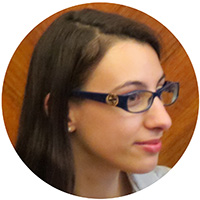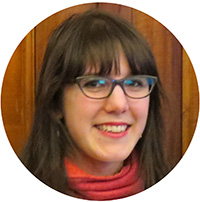Spring School Provides Italian Students Intense Exposure to Russian Culture
‘Texts and Places: Introduction to Russian History, Language and Culture’ (I testi dei luoghi: introduzione alla storia, alla cultura e alla lingua russa), an international Spring School at HSE organized jointly by Julia Ivanova, leading research fellow at the Poletayev Institute for Theoretical and Historical Studies in the Humanities, and the University of Eastern Piedmont Amedeo Avogadro, took place from March 15 to 23.
Over the course of the week, 11 students selected to participate managed not only to learn about Russia’s most prominent architectural and artistic monuments (e.g., Vladimir and Suzdal churches, Tretyakov Gallery, etc.), but also to complete a significant amount of academic work (more than 22 hours of papers devoted to Russian literature, history, art, and cinema; approximately 40 hours of lectures, field investigations – all of which resulted in each student receiving 4 or 5 credits). The school was preceded by intensive language training, with students studying Russian under the direction of Ilya Guryanov and Yury Rudnev, HSE doctoral students.
The Spring School fostered the students’ interest in Russian language and culture; most of them expressed their intention to continue language courses with their tutors via Skype. Several participants in the school agreed to share their impressions:

Martina Vialardi
My first impression of HSE is very positive. This is a very diverse university. The buildings are located in different parts of the city, which is very unusual for Italy. It’s nice to see young people already taking high positions in the university. They do research and help the university arrange the study process in a number of ways… it’s much more complicated in Italy.
What I liked most about the Spring School were the opportunities for discussion and the way the instructors organized lectures. They involved the audience in discussions, instead of simply reading the material. We can probably transfer this experience to Italy, with work taking place not individually, but in groups, as it was during this school; this is how we were able to immerse ourselves in Russian culture. It would be great if in the future lectures could take place directly in the city space, at locations discussed in the lessons rather than in classrooms. It is difficult to see everything in a week, and classes in such form would provide a more intense experience with discussions on site. Of course, that is if the weather allows.
Alessio Cerreia Varale
The experience we got was thrilling and enriching. The way HSE works is very different from what is traditional for Italy. Personally, I not only gained a comprehensive view of Russian culture, but learned a lot of new authors, whom I would like to look at more closely in the future.
I personally have a passion for the Middle Ages, so I liked Suzdal and Vladimir most of all, since we saw some of the earliest traces of Russian history there.

Valentina Tomasin
I’m very pleased with the experience I got. This was a marvellous example of cultural exchange between Italy and Russia. I am so enchanted with Russian culture, literature, and history, that I don’t want to say good-bye. In the workshop-style classes that seem so widespread in Russia, everyone is focused on clear arguments; everyone has his or her own view on the topics being discussed and is eager to present it to others. The clash of various views gives a comprehensive view of culture. In Italy, topics are narrated chronologically, and you can’t touch all sides of history and culture. Of course, I would like to continue studying Russian culture and literature.
Ilya Guryanov
Julia Ivanova
Yury Rudnev
See also:
‘In the Future, I Would Like to Become an HSE University Teacher’
Karina Kuzhanova, third-year student at the Faculty of Law, and Anna Yatsenko, second-year student at the Faculty of Economic Sciences, moved to Moscow from Kazakhstan to study at HSE University. They shared their impressions of studies and student life with the HSE News Service, as well as talking about some of the most inspirational things in the Russian capital.
There Is No Way Back from Globalization, So We Must Learn to Trust Each Other
On January 14, 2019, Professor Giovanni Tria spoke at HSE on contemporary globalization, including its consequences and problems. Below are the key highlights of his talk.
Russian and Italian Intellectuals Speak a Common Language
In late May Moscow hosted a Russian-Italian research conference marking the anniversary of the birth of Italian philosopher Benedetto Croce. The conference entitled 'The Legacy of Benedetto Croce in the 21st Century' was organized by and held at the HSE's Humanities Faculty in conjunction with the Italian Cultural Institute in Moscow.
International Spring School on Human Rights Debates Issues of Religion, Identity and Freedom of Conscience
In May, the HSE Voronovo Learning Centre hosted the International Spring School on Human Rights, a five-day educational retreat organized jointly by the HSE Department of Public Policy, the University of Bologna and the International Institute of Human Rights in Strasbourg.
HSE Becomes Member of Erasmus Student Network
HSE’s volunteer organisation, which is made up of student ‘buddies’ who help foreign students adapt to life in Russia, has become a part of the Erasmus Student Network.
Studying Software Engineering at HSE
The Master’s programme in System and Software Engineering aims to provide students an opportunity not only to acquire the knowledge and experience they need in their chosen profession, but also to help them generate a systemic view on bringing resolutions to the difficult professional challenges they are certain to face in the future. Academic Supervisor Dmitry Alexandrov talks about programme features and international students share their experience of living and studying in Moscow.
Dutch Student Investigates Languages of the Caucasus
Samira Verhees, a Ghent University alumna and doctoral student at the HSE School of Linguistics, spoke about her Caucasian studies.
Students Come from Far and Wide to Study Big Data Systems
The Master’s programme in Big Data Systems at the Higher School of Economics focuses on the value aspect of big data for large enterprises and the implementation of big data technology in enterprises. Two current students of the programme share their thoughts about what drew them to HSE to study big data, what they hope to gain from the programme and what advice they would give to prospective international students.
French Delegation Visits School of Business Informatics to Discuss Cooperation in Big Data Studies
In March 2016, the School of Business Informatics (Faculty of Business and Management) at HSE was visited by a delegation from France’s University of Évry; in late 2015, a student exchange agreement was signed between HSE and this university. The delegation brought 19 students from the Master’s programmes in the field of big data at the University of Évry to Moscow.
American Student Does Mathematical Research at HSE
Nicholas Howell is a PhD student at University of Oregon. He came to HSE Faculty of Mathematics on the invitation of his research advisor Vadim Vologodsky to do research during two months. In his interview Nick talks about his time in Moscow.


